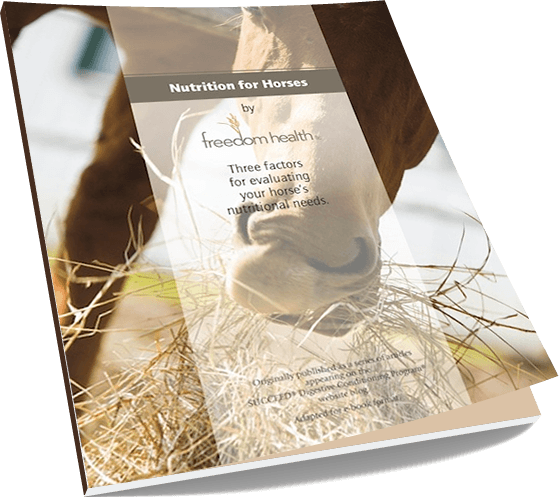Whether your horse is showing obvious signs of discomfort, or seems healthy on the outside, it’s still very likely to be experiencing equine digestive disorders – whether very minor to severe. And it’s often caused by the way we feed horses today.
Natural Digestion Process in Horses
High Forage Diets
Horses in the wild eat primarily grasses and other natural forages. These fibrous foods are very easily digested, and when fermenting in the hindgut provide the majority of the horse’s energy. The only grains they eat are the seeds that are sometimes available in the grasses.
Graze Up to 18 Hours a Day
Horses in the wild (or even domesticated horses on full pasture turnout) graze up to 18 hours a day. This means that they constantly have small amounts of forage-type food passing through their systems. Because they have always have food in their stomachs, the acids that initiate the breakdown of food remain within normal, healthy levels. Then, because the amounts of food that pass through the small intestine are smaller, the digestive tract is kept functioning normally.
Low Energy Requirements
Wild horses spend most of their days wandering slowly over great distances as they graze. And they really only expend energy in short bursts – when they need to escape from a predator. As a result, they don’t have high energy requirements and easily obtain what they need from the forages they eat.
Feeding Horses and Equine Digestive Health
For reasons of both convenience and cost, modern horse care has generally evolved to feeding two flakes of hay and a scoop of grain (or some processed feed) twice a day. Turnout is often limited and horses are required to perform at a much higher level than what they would do naturally. All of this contributes to digestive imbalance, and at a more serious level the high instances of ulcers and colic seen in our horses today.
Large Meals Leave Empty Stomachs
The biggest problem with how we feed horses is in giving them just a few large meals throughout the course of a day. When they are only fed two or three times a day, they end up spending hours with nothing to eat – thus empty stomachs. The equine stomach’s capacity is very small and food stays there for less than an hour. And when the stomach is empty the stomach lining is left unprotected from the acids that aid in digestion, a key component in the onset of gastric ulcers.
Also, when horses spend hours with nothing to eat, they get hungry! Then, when they do get their next meal they end up bolting their feed. The more quickly the eat, the more quickly food moves through the stomach and small intestine. And at these higher transit rates, they are not able to digest food fully. They aren’t getting all of the nutrients that are available and undigested starch reaches the hindgut. And that starch in the hindgut interferes with the digestive processes of the cecum and colon, causing all kinds of trouble.
Processed Feeds Hard to Digest
Our horses often need some kind of processed feed in their diet to provide the nutrition and energy required for performance that they can’t get from forage alone. However, they are are more difficult for horses to digest. While natural oats are more easily digested, other common grains such as barley and corn are not. These, along with the horse eating too quickly or being fed large amounts at once, are another source of undigested starch reaching the hindgut. And molasses, which is added to sweet feeds to make these grains more palatable, contains sugar – which is actually toxic to horses.
Common problems related to both feeding large meals and processed feeds include:
- Decreased appetite
- Inability to maintain weight
- Difficulty recovering quickly from exercise
- Gastric and colonic ulcers
- Diarrhea
- Colic
- Hindgut acidosis
Promote Digestive Health Through Better Feeding
Fortunately, there are a few small steps you can take to make sure your horse’s digestive system is firing on all cylinders. Here are a few tips to get back to a more natural feeding process:
- Feed multiple small meals throughout the day
- Slow down chewing by adding chaff (chopped hay) to grain meals
- Provide free choice hay when stalled or turned out on a dry lot

FREE eBook:
Nutrition for Horses
Three factors for evaluating
your horse’s nutritional needs.
